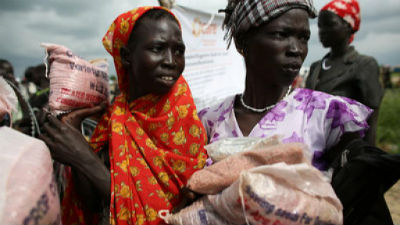 Juba, September 9, 2015 (SSNA) — Extensive and increasing food insecurity in South Sudan is affecting around 4.6 million people, according to the most recent Integrated Phase Classification (IPC) study released in May 2015. In a bid to address the underlying causes of poverty and food insecurity, CARE is expanding our efforts to support communities in Eastern Equatoria improve their access to food and income.
Juba, September 9, 2015 (SSNA) — Extensive and increasing food insecurity in South Sudan is affecting around 4.6 million people, according to the most recent Integrated Phase Classification (IPC) study released in May 2015. In a bid to address the underlying causes of poverty and food insecurity, CARE is expanding our efforts to support communities in Eastern Equatoria improve their access to food and income.
CARE today launched a new food security project called ‘Fortifying Equality and Economic Diversification’ (FEED)\. The Project aims to support 30,000 women and marginalised people to strengthen their long-term food security and self-sufficiency. It will be implemented in three counties of Ikotos, Torit and Magwi, in the Eastern Equatoria State of South Sudan.
This new and more comprehensive and longer term approach aims to address the fundamental roots of food insecurity. “The project’s aims are to reduce people’s heavy dependence on external financial and technical support, make them more resilient and build the foundation for sustained economic growth, thereby fostering stability to dampen the spread of conflict” explains CARE South Sudan’s Country Director, John Hoare.
The project will teach agricultural techniques and support food production and the development of markets, strengthening emerging farmer groups by providing resources that add value to local produce as well as training people on how to process, preserve and use foods. With the efforts of humanitarian organizations such as CARE, combined with the impressive resilience of the South Sudanese people, severe hunger can be averted”, says Hoare.
“While South Sudan is a fragile state that has experienced continuous conflict since its inception, interrupting the livelihoods of hundreds of thousands of citizens, there remain more stable communities that have been able to build up a certain amount of resilience. They represent hope for the young nation and it is here that the bulk of support will be targeted” says Hoare.
As CARE’s Coordinator for the FEED Project, Sylvia Kaawe, points out: “Improving food security and livelihoods in the communities would reduce vulnerabilities, this initiative will help achieve food security needs and create opportunities for communities to improve their access to food and income for months and years to come”.
Since the outbreak of violence, CARE has provided assistance to more than 600,000 people across South Sudan’s three hardest-hit states of Unity, Upper Nile and Jonglei. CARE’s is providing assistance in food security and livelihoods, health, nutrition, peace building and gender based violence.
About CARE in South Sudan
CARE has been operating in Southern Sudan since 1993, initially providing humanitarian relief to internally displaced people in Western Equatoria. The signing of the Comprehensive Peace Agreement in 2005 allowed CARE to expand into Jonglei and Upper Nile states to support returnees from the refugee camps, and the organization has since broadened its operations to include development programs.
Founded in 1945, CARE is a leading humanitarian organization fighting global poverty. CARE has more than six decades of experience helping people prepare for disasters, providing lifesaving assistance when crisis hits, and helping communities recover after the emergency has passed. CARE places special focus on women and children, who are often disproportionately affected by disasters. To learn more, visit www.care-international.org

